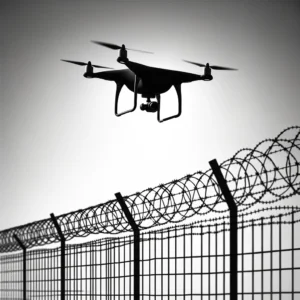
In a significant crackdown named Operation Skyhawk, authorities in Georgia have dismantled what is believed to be the largest smuggling operation within the state’s correctional system. The operation has led to the arrest of 150 individuals, including eight prison employees, under accusations of smuggling drugs, weapons, and other contraband into prisons using drones.
The operation spotlighted a Gwinnett County drone repair shop, Thunder Drones, owned by Robert Schwartz. Schwartz, along with an employee, Nelda Alber, were arrested as part of the investigation. The Georgia Department of Corrections (GDC) agents executed raids on both the shop and Schwartz’s residence, seizing over 50 drones suspected of being used in the smuggling operations.
Governor Brian Kemp expressed his stance on the matter, emphasizing Georgia’s zero-tolerance policy towards activities that endanger community safety and compromise the integrity of correctional facilities. Over 1,000 criminal charges have been filed, highlighting the extensive nature of the smuggling ring which spanned across multiple states and involved a complex network of inmates, their associates, and GDC employees.
The 16-month-long investigation revealed a sophisticated operation where drones were primarily used to smuggle tobacco, marijuana, ecstasy, methamphetamine, cocaine, opioids, and pills, some containing fentanyl, into the prisons. This operation also led to the confiscation of dozens of weapons and over 400 cellphones.
Operation Skyhawk is notable not only for its scale but also for the breadth of its impact, with GDC Special Agent Gregg Phillips noting the recovery of hundreds of pounds of contraband. The operation’s success sheds light on the evolving challenges correctional facilities face from technological advancements and underscores the importance of ongoing vigilance and innovation in law enforcement strategies. Currently, the use of cUAS technology is not permitted except by federal agencies in specific circumstances: a situation which makes it easier for criminals to enter secure areas with drones.
This case has drawn attention to the critical role of internal and external cooperation in combating contraband smuggling within the prison system. With charges ranging from drug trafficking and possession of firearms by convicted felons to violations of the Racketeer Influenced and Corrupt Organizations (RICO) Act and participating in criminal gang activity, the legal proceedings following these arrests will be closely watched.
Read more:
- UK Government Implements No-Fly Zones Around Prisons to Combat Contraband Smuggling via Drones
- Counter UAS Update, From the Floor of National Public Safety UAS Conference
- Counter Drone Technology: White Fox Wins Drone Defense Contract in South Asia
- DRONELIFE Exclusive: SkySafe CEO on Making Remote ID Work as Intended

Miriam McNabb is the Editor-in-Chief of DRONELIFE and CEO of JobForDrones, a professional drone services marketplace, and a fascinated observer of the emerging drone industry and the regulatory environment for drones. Miriam has penned over 3,000 articles focused on the commercial drone space and is an international speaker and recognized figure in the industry. Miriam has a degree from the University of Chicago and over 20 years of experience in high tech sales and marketing for new technologies.
For drone industry consulting or writing, Email Miriam.
TWITTER:@spaldingbarker
Subscribe to DroneLife here.